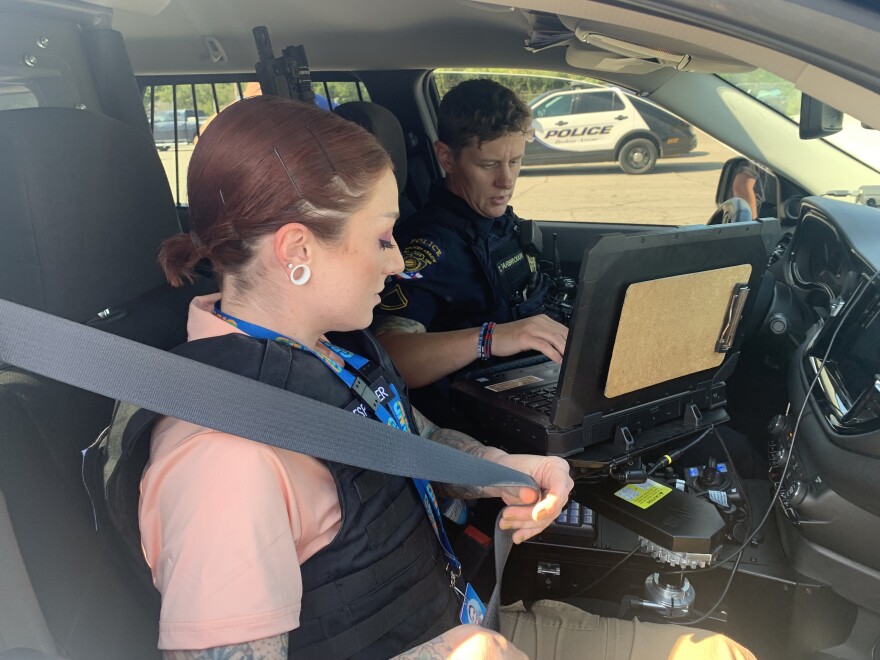For the past several weeks, Tessa Mitchell has been riding in the front seat of a police cruiser.
Mitchell is a care coordinator for the nonprofit Grand Mental Health — it’s her job to get people in crisis to community resources. She’s paired with Tiffany Yarborough, a Broken Arrow police officer.
Mitchell and Yarborough work the evening shift for the Broken Arrow Police Department’s new Crisis Response Team through a partnership with Grand. The kinds of calls they respond to include mental illness, substance abuse, homelessness, children in crisis and domestic disturbances with mental health components.
“Our CRT team in the day can focus a lot more on outreach and things like that, building those community networking bonds, if you will, because organizations are opened during the day. But at nighttime, it’s kind of a whole different animal, I would say,” Mitchell said. “A lot more direct crises, I would say, tend to happen at night.”
It’s one of a handful of such crisis response teams in the region that have paired specialists with patrol officers — Tulsa and Bartlesville have these teams, too.
The initiatives come as increased scrutiny is being placed on Oklahoma’s psychological care. Federal authorities this year have proposed a consent decree, meaning the state would be required to take specific actions to address its lack of public mental health services. The feds also continue to scrutinize Oklahoma City police for possible rights violations against people with disabilities.
In Broken Arrow, police received 186 crisis calls through Aug. 29 in 2024, roughly one every two days. BAPD Chief Brandon Berryhill says he hopes the specialists will fill in gaps for the police department.
“Although officers have some specialty training and some of them are special trained specifically for this, we’re not mental health professionals, and a lot of times, the services we can offer are really for temporary safety reasons only,” said Berryhill.
Berryhill says the specialist can get a person in crisis in touch with services at Grand, at other agencies like Veterans Affairs, or direct them to medical care. He says addressing mental health issues quickly can stop downward spirals that end up affecting a lot of people.
“A lot of times, the people that we deal with are in a true crisis. We go out and see them all the time; we get to know them by name,” he said. “And so if we can get one person in services that they’re not in services at all — whether that be counseling or treatment of some kind — and we eliminate that call, that eliminates all future calls.”
While Berryhill spoke highly of the CRT program, he still believes police should be present at calls. He says officers provide safety because specialists are not armed.
Jim Warring, GRAND’s law enforcement engagement director, says specialists bring an alternative approach to police, even if they are on scene.
Warring said this is useful, since in his opinion police function like “Ghost Busters.”
“They’re the ones that everybody will initially call first,” he said. “The team is going to be able to say, ‘Well, we have services available at Grand A, B and C that can maybe help the situation that you’ve got — we’ll follow up with you, we’ll give you some more information, we’ll try to encourage you and your loved one to try and get those services.’ Keep the family intact."
Officer Yarborough says people in crisis often respond more positively to the specialists than to police.
“A lot of stigma comes with law enforcement regarding mental health, so if they don’t want to talk to me, it’s easier for me to step back and explain that (Mitchell is) not an officer, and they’re usually more open to speaking with her,” Yarborough said.
Berryhill says city officials will evaluate the success of the program as the officers and specialists continue to respond to calls.
“Mental health — if it rises, it raises everybody. So it’s not just helping the few — it’s helping the family, the community and everybody,” he said.



